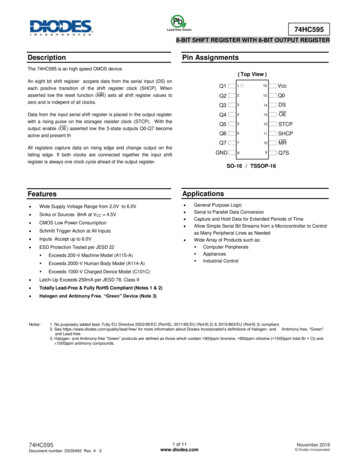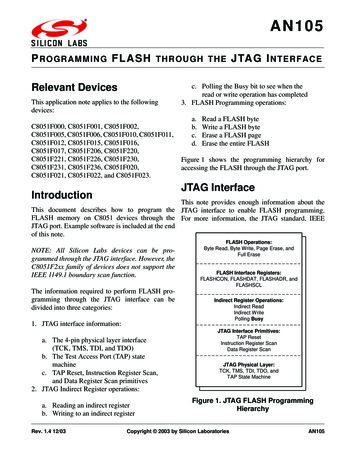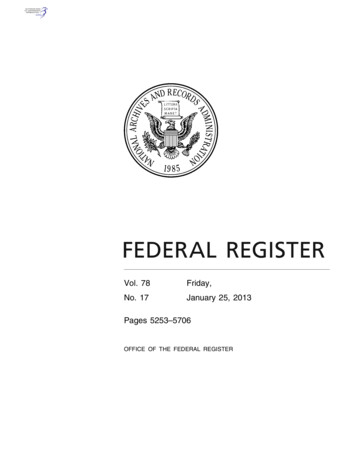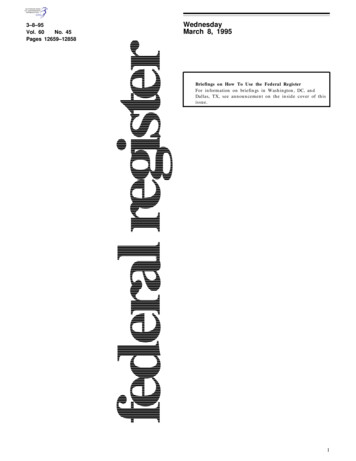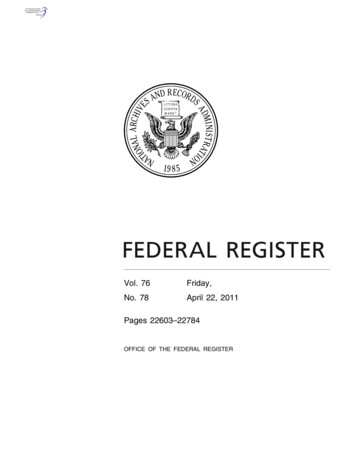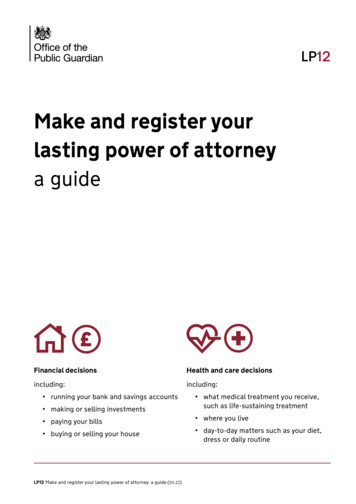
Transcription
LP12Make and register yourlasting power of attorneya guideFinancial decisionsHealth and care decisionsincluding:including: running your bank and savings accounts making or selling investments what medical treatment you receive,such as life-sustaining treatment paying your bills where you live buying or selling your house day-to-day matters such as your diet,dress or daily routineLP12 Make and register your lasting power of attorney: a guide (03.22)
IndexHow to use this guide3Part AMake your lasting power of attorney (LPA)7Part A1The donor8Part A2The attorneys10Part A3How should your attorneys make decisions?13Part A4Replacement attorneys17Part A5When can your attorneys make decisions?(LPA for financial decisions only)22Part A5Life-sustaining treatment(LPA for health and care decisions only)24Part A6People to notify when the LPA is registered27Part A7Preferences and instructions28Part A8Your legal rights and responsibilities34Part A9Signature: donor36Part A10Signature: certificate provider38Part A11Signature: attorney or replacement attorney40Part B 1Register your lasting power of attorney (LPA)41Part B2Register your lasting power of attorney42Part B3Who do you want to receive the LPA?42Part B4Application fee43Part B5Signature44Part C People to notify45Part D47Cancelling your LPA, concerns about attorneys, privacy policy andcontacting the Office of the Public Guardian2Helpline0300 456 0300
How to use this guideThis guide gives you information aboutmaking and registering your lasting powerof attorney (LPA). You don’t have to read itnow. You can start filling in your LPA formand look at the guide if you need moreinformation.Your lasting power ofattorney (LPA)An LPA is a legal document that lets you(the ‘donor’) choose trusted people(‘attorneys’) to make financial decisions orhealth and care decisions on your behalf.An LPA is mainly used if you don’t have themental capacity to understand and makedecisions yourself. You need mental capacityto make an LPA.Mental capacity is the ability to make aspecific decision at the time that it needsto be made.Your LPA is only for England and Wales. Itprobably won’t work elsewhere, so you maywish to seek legal advice if you want it to.You don’t need a lawyer to make anLPA, unless you have unusual or specificrequirements.Sections in the LPA form where you mightwant legal advice are marked with thislawyer symbol:Making your LPA: which type?You’ll have to choose what sort of decisionyou’ll need help with. There are two kinds ofLPA, covering two kinds of decision: money, finances and property health and careEach LPA has its own form. To choose both,fill in both forms.Financial decisions: use formLP1FFinancial decisions might be about: opening, closing and using your bankand building society accounts claiming, receiving and using yourbenefits, pensions and allowances paying your household, care andother bills making or selling investments buying or selling your homeYou choose whether your attorneys can actfor you as soon as the LPA is registered oronly if you can no longer understand andmake decisions (see part A5 of this guide).You don’t have to own your own home orhave a lot of money to make an LPA forfinancial decisions. For example, if it’s hardto manage your bank account or bills alone,you may want someone to help.You can appoint different attorneys for yourpersonal finances and your business affairs.To do this, fill in two LP1F forms.It’s up to you to decide whether you wantlegal advice to fill in these sections.Helpline0300 456 03003
Health and care decisions:use form LP1HPeople you must have tomake an LPAHealth and care decisions might be about: giving or refusing consent tohealth care staying in your own home and gettinghelp and support from social services moving into residential care and findinga good care home day-to-day matters such as your diet,dress or daily routineDonor: see part A1 of this guide.Your attorneys can only make decisions whenyou don’t have mental capacity.One very important decision has its ownsection in a health and care LPA. You canchoose whether your attorneys or yourdoctors should make decisions aboutaccepting or refusing medical treatmentto keep you alive, if you can’t make orunderstand that decision yourself.Read more about life-sustaining treatment inpart A5 of this guide.You don’t have to have complex health orcare problems to make an LPA. It’s a way ofplanning for your care in case you can’t makedecisions for yourself in future.People involved in your LPAYou (the donor) need to choose people foryour LPA. Discuss this with them before youname them in your LPA form.Before the official form starts, there’s a pageto make a note of everyone involved in theLPA – you don’t have to fill it in, but youmight find it useful.4Attorneys: see part A2 of this guide.Certificate provider: see part A10 of thisguide.Witnesses: an impartial person must witnessyou and your attorneys signing your LPA.You can’t witness your attorneys’ signaturesand they can’t witness yours.People you might want toinclude in your LPAReplacement attorneys: see part A4 ofthis guide.People to notify: see part A6 of this guide.Registering your LPABefore you can use your LPA, you mustregister it with the Office of the PublicGuardian (OPG). It costs 82 to register yourLPA so that it’s ready to use. It’s best toapply to register your LPA as soon as you’vefilled in the form.Helping a friend to makean LPAIf you’re helping a friend or relative withan LPA by filling in the form for them, thatperson must make all the choices whenmaking the LPA. If they can no longer makethese choices independently, you can’tmake an LPA for them. You can apply to theCourt of Protection, who will appoint you orsomeone else to help them. Find out more atwww.gov.uk/become-deputyHelpline0300 456 0300
Your LPA packYou’ve been sent all the documents that youneed to make and register your LPA.These are: form LP1F to make a financial LPA form LP1H to make a health andcare LPA form LP3 if you want to notify peoplewhen your LPA is sent for registration continuation sheets 1 to 4 – you only usethese if the LPA form says you should form LPA120 to apply for a reduced feeif you have low incomeIf we have sent you a pack and any of theseare missing, please call us on0300 456 0300 or download them ng-power-of-attorneyMake your LPA onlineYou can also make your LPA using our digitalservice. It’s quick and easy to do. There’smore information at our website,www.gov.uk/power-of-attorneyIf you need help making yourLPA onlineIf you’d like to make your LPA online but areunsure about using computers and websites,please ring our contact centre on0300 456 0300 and we’ll try to help.What is ‘mental capacity’?Your LPA – and this guide – mentions ‘mentalcapacity’ a lot. It’s important to understandthis idea before you make an LPA.‘Mental capacity’ means the ability to makea specific decision at the time it needs to beHelpline0300 456 0300made. A person with mental capacity has atleast a general understanding of: the decision they need to make why they need to make it any information relevant to the decision what is likely to happen when theymake itThey should be able to communicate theirdecision through speech, signs, gestures orin other ways.People can sometimes make certaindecisions but don’t have the mental capacityto make others. For example, someone maybe able to decide what to buy for dinner butbe unable to understand and arrange theirhome insurance.Assessing mental capacityTo work out whether someone lacks themental capacity to make a decision, youneed to answer ‘yes’ to these two questions:1. Do they have a mental or brain problemthat stops their brain or mind fromworking properly?2. Is that problem causing them suchdifficulty now that they are unable tomake this particular decision at thetime it needs to be made?Being ‘unable to make this particulardecision’ means that the person can’t: understand relevant information aboutthe decision that needs making keep that information in their mind longenough to make the decision weigh up the information in order tomake the decision communicate their decision – this couldbe by talking, using sign language,pictures or even just squeezing a handor blinking.5
Sometimes – especially in the case of bigor complex decisions – you may want to getprofessional advice, for example, from theperson’s GP, psychiatrist or psychologist.Mental Capacity Act 2005and Code of PracticeThe Mental Capacity Act 2005 covers LPAs.The Mental Capacity Act Code of Practiceexplains more and has examples, includinghow attorneys must act. The Code ofPractice also has more information aboutmental capacity.You can find the Mental Capacity ActCode of Practice online atwww.gov.uk/opg/mca-codeYou can also buy a printed version from theStationery Office: www.tsoshop.co.ukcan. They must take all practical stepsto help you to make a decision. Theycan only treat you as unable to make adecision if they have not succeeded inhelping you make a decision throughthose steps.3. Your attorneys must not treat youas unable to make a decision simplybecause you make an unwise decision.4. Your attorneys must act and makedecisions in your best interests whenyou are unable to make a decision.5. Before your attorneys make a decisionor act for you, they must considerwhether they can make the decisionor act in a way that is less restrictiveof your rights and freedoms but stillachieves the purpose.Attorneys always have to follow theseprinciples.Your local library may be able to help if youcan’t get online by yourself.Contact usMaking decisions for youAttorneys can make some decisions on yourbehalf, but they can’t do as they please. Theyalways have to act in your best interests.The Mental Capacity Act Code of Practicegoes into this much more fully. It sets outfive basic principles an attorney has to followwhen working out whether and how to act onyour behalf:1. Your attorneys must assume that youcan make your own decisions unless itis established that you cannot do so.2. Your attorneys must help you to makeas many of your own decisions as you6Office of the Public Guardian,PO Box 16185, Birmingham B2 kTelephone: 0300 456 0300Textphone: 0115 934 2778Calling from abroad: 44 300 456 0300Monday to Friday: 9am to 5pm (exceptWednesday)Wednesday: 10am to 5pmWebsite: www.gov.uk/opgHelpline0300 456 0300
Part A – make your LPAChoose form LP1F to make an LPA for financial decisions or LP1H to make an LPA for healthand care decisions.Start filling in the form now.You don’t need to read this guide first. Use it while you’re completing the form.Before the official form starts, there’s a page to make a note of everyone involved in the LPA– you don’t have to fill it in, but you might find it useful.When you see the word ‘you’ from now on, in part A of this guide, it means the donor: theperson appointing other people to make decisions on their behalf.The first proper pages of the forms look like this:Helpline0300 456 0300Restrictions – you must be at least 18 years old and be able to understandand make decisions for yourself (called ‘mental capacity’).TitleSection 1The donorHelp?You are appointing other people to make decisions on your behalf.You are ‘the donor’.Last nameHelp?You are appointing other people to make decisions on your behalf.You are ‘the donor’.For help with thissection, see theGuide, part A1.Restrictions – you must be at least 18 years old and be able to understandand make decisions for yourself (called ‘mental capacity’).If you are filling this in fora friend or relative andthey can no longer makedecisions independently,they can’t make an LPA.See the Guide ‘Before youstart’ for more information.First namesLasting power of attorney forproperty and financial affairsTitleLast nameAny other names you’re known by (optional – eg your married name)Date of birthDate of stcodeEmail address (optional)Email address (optional)For OPG office use onlyLPA registration dateDayMonthFor OPG office use onlyOPG reference numberLPA registration dateYearOnly valid with the official stamp here.For help withthis section,see theGuide, part A1.If you are filling this in fora friend or relative andthey can no longer makedecisions independently,they can’t make an LPA.See the Guide ‘Before youstart’ for more information.First namesAny other names you’re known by (optional – eg your married name)Day* 1F*Section 1The donor* 1H*Lasting power of attorney forhealth and welfareHelpline0300 456 0300DayLP1H Health and welfare (07.15)1MonthOPG reference numberYearOnly valid with the official stamp here.LP1F Property and financialaffairs (07.15)1If your forms don't look like this, you may be using old versions. Download the most recentones, or call the Office of the Public Guardian’s contact centre on 0300 456 0300 torequest them.Helpline0300 456 03007
Part A1 – the donorFill in section 1Helpline0300 456 0300Section 1The donorFill in your details in section 1 of the LPA form. You can also give anemail address, but it’s optional.Help?For help withthis section,see theGuide, part A1.You are appointing other people to make decisions on your behalf.You are ‘the donor’.Restrictions – you must be at least 18 years old and be able to understandand make decisions for yourself (called ‘mental capacity’).Title* 1F*Lasting power of attorney forproperty and financial affairsIf you are filling this in fora friend or relative andthey can no longer makedecisions independently,they can’t make an LPA.See the Guide ‘Before youstart’ for more information.First namesLast nameAny other names you’re known by (optional – eg your married name)Give any other names that you use, such as your married name.If your LPA does not include all the names you’re known by, theremay be confusion or delays if your attorneys need to use it.Date of birthDayMonthYearAddressPostcodeEmail address (optional)For OPG office use onlyLPA registration dateDayMonthOPG reference numberYearLP1F Property and financialaffairs (07.15)Only valid with the official stamp here.1More informationWho can be a donor?An LPA is for just one person. You can makean LPA if: you are at least 18 years old you have the mental capacity to do so‘Mental capacity’ means the ability to makeand understand a specific decision at thetime it needs to be made.Most people can make an LPA. However,there could be complications because of: residency – if you live or have propertyoutside England and Wales bankruptcy – if you are bankrupt orsubject to a debt relief order andwant to make an LPA for your financialdecisionsThere’s more on these complications on thispage and page 9.8Can someone help the donor tofill in the form?Yes. However, if anyone else is filling theform in for you, you must still choose whatgoes into your LPA. Only you can give othersthe power to make decisions with your LPAon your behalf.Complications: residency andpropertyLPAs cover people who live or own assets inEngland and Wales. Your LPA may not workin other countries, including Scotland andNorthern Ireland. You may want to get legaladvice if: you live outside England and Wales you have property outside England andWales and you’re making an LPA forfinancial decisions you’re planning to move away fromEngland and Wales there are other reasons why where youlive complicates your situationHelpline0300 456 0300
Complications: bankruptcy anddebt relief orders (LPA for financialdecisions only)There are rules about bankruptcy and debtrelief orders for a property and financialaffairs LPA.If you’re bankrupt or subject to a debt relieforder, you can make, sign and register anLPA for financial decisions. However, yourattorneys will not have power over all of yourproperty.If this applies to you, you should thinkabout getting legal advice before youmake your LPA.If you become bankrupt or subject to a debtrelief order after your financial LPA is madeor registered, it will be cancelled.If an attorney becomes bankrupt or subjectto a debt relief order, they can no longer beyour attorney under your LPA for financialdecisions.Bankruptcy does not affect a health andcare LPA.Helpline0300 456 03009
Part A2 – the attorneysFill in section 2Section 2The attorneysHelpline0300 456 0300The people you choose to make decisions for you are called your ‘attorneys’.Your attorneys don’t need special legal knowledge or training. They shouldbe people you trust and know well. Common choices include your husband,wife or partner, son or daughter, or your best friend.*1F2*You need at least one attorney, but you can have more.You’ll also be able to choose ‘replacement attorneys’ in section 4. They canstep in if one of the attorneys you appoint here can no longer act for you.Fill in the names, addresses and dates of birth of your attorneys.The order in which you write the attorneys’ details on the formdoesn’t matter. Each attorney is as important as the others.If you want more than four attorneys, mark the ‘More attorneys’ boxon this page with an ‘X’. Take a copy of Continuation sheet 1, called‘Additional people’. For each extra attorney, mark the ‘Attorney’box on the sheet and add their details. You must sign and dateContinuation sheet 1 before you sign the LPA form in section 9.To appoint a trust corporation, fill in the first attorney space and tick the boxin that section. They must sign Continuation sheet 4. For more about trustcorporations, see the Guide, part A2.Restrictions – Attorneys must be at least 18 years old and must have mentalcapacity to make decisions. They must not be bankrupt or subject to a debtrelief order.TitleFirst namesTitleFirst namesLast name (or trust corporation name)Last nameDate of birthDate of birthDayMonthYearDayHelp?For help with thissection, see theGuide, part A2.MonthYearAddressAddressPostcodePostcodeEmail address (optional)Email address (optional)This attorney is a trust corporation.LP1F Property and financialaffairs (07.15)Only valid with the official stamp here.2If you need more than one continuation sheet, you can make copies.If you want to choose a trust corporation as an attorney for yourLPA for financial decisions, fill in the details here and mark the ‘trustcorporation’ box with an ‘X”. Make sure that you write the exactname that the trust corporation uses.The trust corporation representatives must fill in and signContinuation sheet 4.More informationThe people you choose to act for you arecalled your attorneys.You must have at least one attorney. There’sno upper limit but too many attorneys couldmake things difficult, as they’ll need to worktogether.Make sure that each person agrees to be yourattorney before you name them in your LPA.When selecting attorneys, think about: how many you want to appoint and ifthey’ll be able to work together whether you trust them to act in yourbest interests how well you know each other and howwell they understand you10 how willing they’ll be to make decisionsfor you how well they organise their ownaffairs, such as how well they look aftertheir own moneyDon’t feel you have to choose someone justbecause you don’t want to offend them. Ifyou want them to feel involved, you couldmake them a ‘person to notify’ instead.(See part A6 of this guide.)Who can be an attorney?In legal terms, an ‘attorney’ is a personwho’s allowed to act on behalf of someone.Attorneys don’t need to be solicitors.Most people choose family members,Helpline0300 456 0300
friends and other people they trust with Your attorneys must not treat youno legal background. If an attorney is not aas unable to make a decision simplyprofessional, the important thing is that youbecause you make an unwise decision.know each other well and they respect your Your attorneys must act and makeviews and will act in your best interests.decisions in your best interests whenyou are unable to make a decision.You can ask anyone with mental capacity Before your attorneys make a decisionaged 18 or over to be your attorney,or act for you, they must considerincluding:whether they can make the decision your wife, husband, civil partner oror act in a way that is less restrictivepartnerof your rights and freedoms but still a family memberachieves the purpose. a close friend a professional, such as a solicitorAttorneys always have to follow theseprinciples.Attorneys must sign your LPA after you havesigned section 9 and the certificate providerYou can find the Mental Capacity Act Code ofhas signed section 10. They have to signPractice at www.gov.uk/opg/mca-codeas soon as reasonably possible after theProperty and financial affairs LPAcertificate provider – ideally on the same day.What attorneys must doAttorneys can make some decisions on yourbehalf, but they can’t do as they please. Theyalways have to act in your best interests.The Mental Capacity Act Code of Practicegoes into this much more fully. It sets outfive basic principles an attorney has to followwhen working out whether and how to act onyour behalf: Your attorneys must assume that youcan make your own decisions unless itis established that you cannot do so. Your attorneys must help you to makeas many of your own decisions as youcan.They must take all practical steps tohelp you to make a decision. They canonly treat you as unable to make adecision if they have not succeeded inhelping you make a decision throughthose steps.Helpline0300 456 0300attorneysSome people choose a professional attorney,such as a solicitor, for their financial LPA.If you appoint a professional attorney for aproperty and financial affairs LPA, such as asolicitor, you must name an individual. Youcan’t just give a job title or the name of a firm.Professional attorneys usually charge fees.Ask what fees they will charge you. You mustadd instructions in section 7 about whatyou’ve agreed to pay them. (See part A7 ofthis guide.)An undischarged bankrupt or a person subjectto a debt relief order can’t be an attorney fora property and financial affairs LPA.Bankruptcy and debt relief orders don’taffect health and welfare LPAs.11
Trust corporation – property andfinancial affairs LPA only (form LP1F)People with complex finances or who don’thave anyone to manage their finances maychoose a trust corporation as their attorney.This is usually a commercial bank or firm ofsolicitors.You should ask what fees they will chargeyou. You may want to get legal advice if youare thinking of choosing a trust corporationas an attorney.Health and welfare LPA attorneysAn attorney for a health and welfare LPAmust be a person, not a company. You canhave as many attorneys as you need.Who can’t be an attorneyA person who is currently bankrupt or has adebt relief order can’t be an attorney on anLPA for financial decisions.Bankruptcy and debt relief orders don’taffect health and welfare LPAs.A person who is on the Disclosure andBarring Service’s barred list cannot act as anattorney – unless they’re a family memberand they’re not getting a fee to be yourattorney. They will break the law if they do.Find out more at www.gov.uk/dbsWhat attorneys can doWhen attorneys can no longer actAn attorney can’t act for you if they: lose mental capacity decide they no longer want to act asyour attorney (known as ‘disclaimingtheir appointment’) become bankrupt or subject to a debtrelief order and were an attorney for afinancial LPA were your wife, husband or civil partnerbut your relationship has legally ended– unless you write instructions insection 7 of the LPA form that they cancontinue to be your attorney if yourrelationship legally endsSometimes, if an attorney dies or has to stopacting for one of the reasons above, it cancause serious problems: if you appointed only one attorney,your LPA would stop working altogether if you’ve said your attorneys have toact ‘jointly’ for some or all decisions(see part A3 of this guide) then theywon’t be able to make those decisionsIf either of these apply to you, considerappointing replacement attorneys to protectyour LPA. Read more about replacementattorneys in part A4 of this guide.If you cancel your LPA, your attorneys can nolonger act on your behalf.Your attorneys can only make decisions thatyou’ve allowed them to make in your LPA.For example, if your LPA is for your financialdecisions, your attorneys can’t makedecisions about your care or daily routine.If your LPA is for your health and care, theycan’t make decisions about your money.12Helpline0300 456 0300
Part A3 – how should your attorneysmake decisions?Fill in section 3Section 3How should your attorneys make decisions?You need to choose whether your attorneys can make decisions on their ownor must agree some or all decisions unanimously.Whatever you choose, they must always act in your best interests.Helpline0300 456 0300*1F3*I only appointed one attorney (turn to section 4)How do you want your attorneys to work together? (tick one only)Mark only one box on this page with an ‘X’.If you’ve chosen just one attorney, tick the box: ‘I only appointed oneattorney’ and go to section 4.If you’ve chosen two or more attorneys, you must state how theyshould make decisions on your behalf. Choose one of three optionsby marking only one box with an ‘X’: jointly and severally jointly jointly for some decisions, jointly and severally for other decisionsJointly and severallyAttorneys can make decisions on their own or together. Most peoplechoose this option because it’s the most practical. Attorneys can gettogether to make important decisions if they wish, but can make simpleor urgent decisions on their own. It’s up to the attorneys to choose whenthey act together or alone. It also means that if one of the attorneys diesor can no longer act, your LPA will still work.Help?For help with thissection, see theGuide, part A3.If one attorney makes a decision, it has the same effect as if all theattorneys made that decision.JointlyAttorneys must agree unanimously on every decision, however big orsmall. Remember, some simple decisions could be delayed because ittakes time to get the attorneys together. If your attorneys can’t agree adecision, then they can only make that decision by going to court.Be careful – if one attorney dies or can no longer act, all your attorneysbecome unable to act. This is because the law says a group appointed‘jointly’ is a single unit. Your LPA will stop working unless you appoint atleast one replacement attorney (in section 4).Jointly for some decisions, jointly and severally for other decisionsAttorneys must agree unanimously on some decisions, but can makeothers on their own. If you choose this option, you must list thedecisions your attorneys should make jointly and agree unanimouslyon Continuation sheet 2. The wording you use is important. There areexamples in the Guide, part A3.Be careful – if one attorney dies or can no longer act, none of yourattorneys will be able to make any of the decisions you’ve said should bemade jointly. Your LPA will stop working for those decisions unless youappoint at least one replacement attorney (in section 4). Your originalattorneys will still be able to make any of the other decisions alongsideyour replacement attorneys.Only valid with the official stamp here.If you choose‘jointly for somedecisions ’, you maywant to take legaladvice, particularlyif the examples inpart A3 of the theGuide, don’t matchyour needs.LP1F Property and financialaffairs (07.15)4Each choice is explained in section 3 of the LPA form and below.If you are not sure which option is best for your circumstances,you may want to get legal advice.Most people choose ‘jointly and severally’ because it is the mostflexible and practical way for attorneys to make decisions.If you choose a different option from ‘jointly and severally’ and yourattorneys can’t unanimously agree a joint decision, it can’t be made.Your LPA might become unworkable.If you choose ‘jointly for some decisions, jointly and severallyfor other decisions’, you must use Continuation sheet 2. OnContinuation sheet 2: mark the box ‘Decisions attorneys should make jointly’ write in the space which decisions your attorneys must makejointly (see More information below for examples of what youmight write)If you use Continuation sheet 2, you must sign and date it (and anyextra copies that you use) before you sign section 9 of your LPA.Helpline0300 456 030013
More informationYou must state how your attorneys shouldact – whether they can make decisionsseparately, or whether they have to agreesome or all decisions unanimously. You needto choose one of three options. The detailsare below.Jointly and severally (attorneys acteither together or individually)Your attorneys can make decisions on yourbehalf on their own or together.Any action taken by any attorney alone is asvalid as if they were the only attorney. It’s upto your attorneys to choose how they makedecisions but they must always act in yourbest interests.Most people choose this option because: attorneys can make simple or urgentdecisions quickly and easily, withoutasking your other attorneys if an attorney can no longer act,the LPA won’t be cancelledIf you choose this option, you must notsay anywhere else in the LPA that certaindecisions must be made by: one particular attorney some or all of your attorneys a minimum number of attorneysInstructions like this contradict your choicehere, so your LPA may be rejected.There is a section later in the LPA that letsyou give more specific instructions to yourattorneys. Most people don’t do this, andit can be more complicated than it seems.Read part A7 of this guide before decidingwhether to add anything there.14Jointly (attorneys agree every decisionunanimously)Your attorneys must always make alldecisions together. They must agreeunanimously and they must all sign anyrelevant documents.Choose this option if you want your attorneysto agree o
1. Your attorneys must assume that you can make your own decisions unless it is established that you cannot do so. 2. Your attorneys must help you to make as many of your own decisions as you can. They must take all practical steps to help you to make a decision. They can only treat you as unable to make a decision if they have not succeeded in
